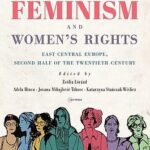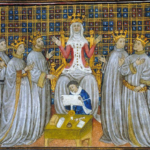Christopher Fletcher, Anaïs Albert, Julie Marfany, Marianne Thivend, Valentina Toneatto (Univ. de Paris-Cité)
Time: 19.-20.06.2025
Venue: Univ. de Paris-Cité
Proposals by: 06.01.2025
The control and use of money are clearly perceived as a gender issue in the present day. In France, the possibility for a married woman to open a savings account in her own name dates to 1881, to control her own salary to 1907, and the right open a current account to 1965: so many milestones on the road to emancipation. As a pessimistic counterpoint, in The Handmaid’s Tale, published in 1985, Margaret Atwood imagined a dystopian future in which the brutal suppression of access to money was the first marker of the enslavement of women. Historians, however, have not yet fully taken up this theme, which makes it difficult to understand developments over the long term and from a comparative perspective. Specialists in the literature have been more active, tracing, for example, the conceptual link between the corruption brought about by money and the corruption brought about by women. Women’s work, too, has been and still is a well-established theme in historical research. Yet money itself – its management and control, the way it can be used as a tool of domination or as a lever for action, the question of who owns it and who controls it – has rarely been posed as an independent long-term historical question. Although the question of gender and money has emerged peripherally in many fields of study, it has never been taken on as an issue in its own right.
One of the main reasons for this relative neglect is the difficulty of defining what money is over a very long period and in a wide variety of historical societies. This polysemous term refers both to wealth (income and assets, in stock or in flow, which can be accounted for abstractly through accounts, tables or balance sheets) and to the materiality of money in circulation (cash, coins and banknotes, as well as the alternative currencies studied, for example, by the sociologist Viviana Zelizer). Sociologists and anthropologists have helped to distinguish money – which is a social, political and moral fact – from currency, a more limited concept used in economics to designate the instrument of exchange. Money encompasses, but is not limited to, cash, because it takes on its meaning through the prism of the social context, but also of affects, values, mores, beliefs, the collective imagination and, more generally, the symbolic order that underpins them (Baumann et alii, 2008). This definition invites us to look at the gendered aspects of relationships with money: money is a concrete means of ensuring masculine domination, but it can also be a tool used by women to create room for manoeuvre. This broad understanding of money is also a welcome invitation to historians: highly variable from one era to the next, money becomes a powerful indicator of gender norms and social relations between men and women. Read more and source … (Web)
 Geschlechterhistorischer Studientag 2024, Bergische Universität Wuppertal (Web)
Geschlechterhistorischer Studientag 2024, Bergische Universität Wuppertal (Web)
 Transformative Salon
Transformative Salon  Tanzquartier Wien (TQW) – TQW-Theorieprogramm
Tanzquartier Wien (TQW) – TQW-Theorieprogramm  Manon Raynal, Univ. de Lorraine/IFRA-SHS und Sita Steckel, Goethe-Univ.
Manon Raynal, Univ. de Lorraine/IFRA-SHS und Sita Steckel, Goethe-Univ.  Historikerinnentreffen 1984: Sigrun Bohle, Christa Hämmerle, Gertrude Langer-Ostrawsky und Beatrix Schmid-Bechtel in Koop. mit L’Homme. Europäische Zeitschrift für Feministische Geschichtswissenschaft
Historikerinnentreffen 1984: Sigrun Bohle, Christa Hämmerle, Gertrude Langer-Ostrawsky und Beatrix Schmid-Bechtel in Koop. mit L’Homme. Europäische Zeitschrift für Feministische Geschichtswissenschaft